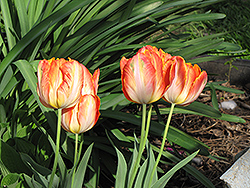Apricot Parrot Tulip
Tulipa 'Apricot Parrot'
Plant Height: 15 inches
Flower Height: 20 inches
Spacing: 6 inches
Sunlight:
![]()
Hardiness Zone: 4a
Description:
Big feather edged blooms of apricot-yellow with tinges of rose and ivory, that are excellent for cutting; a pleasing mild fragrance; visually stunning when massed in the garden
Ornamental Features
Apricot Parrot Tulip has masses of beautiful lightly-scented double peach cup-shaped flowers with creamy white overtones, gold eyes and rose streaks at the ends of the stems in mid spring, which are most effective when planted in groupings. The flowers are excellent for cutting. Its sword-like leaves remain green in color throughout the season.
Landscape Attributes
Apricot Parrot Tulip is an herbaceous perennial with tall flower stalks held atop a low mound of foliage. Its medium texture blends into the garden, but can always be balanced by a couple of finer or coarser plants for an effective composition.
This is a relatively low maintenance plant, and should not require much pruning, except when necessary, such as to remove dieback. It has no significant negative characteristics.
Apricot Parrot Tulip is recommended for the following landscape applications;
- Mass Planting
- General Garden Use
Planting & Growing
Apricot Parrot Tulip will grow to be about 15 inches tall at maturity extending to 20 inches tall with the flowers, with a spread of 12 inches. When grown in masses or used as a bedding plant, individual plants should be spaced approximately 6 inches apart. It grows at a medium rate, and under ideal conditions can be expected to live for approximately 10 years. As an herbaceous perennial, this plant will usually die back to the crown each winter, and will regrow from the base each spring. Be careful not to disturb the crown in late winter when it may not be readily seen! As this plant tends to go dormant in summer, it is best interplanted with late-season bloomers to hide the dying foliage.
This plant should only be grown in full sunlight. It does best in average to evenly moist conditions, but will not tolerate standing water. It is not particular as to soil type or pH. It is highly tolerant of urban pollution and will even thrive in inner city environments. This particular variety is an interspecific hybrid. It can be propagated by multiplication of the underground bulbs; however, as a cultivated variety, be aware that it may be subject to certain restrictions or prohibitions on propagation.

